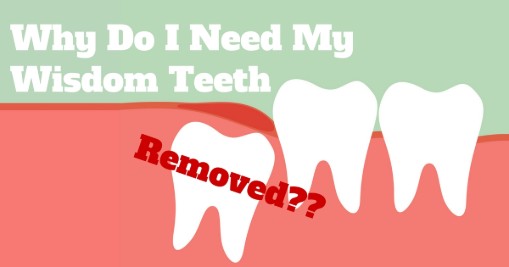Wisdom Teeth FAQ


Why are they called wisdom teeth?
The prevailing idea is that the term wisdom teeth arose from the time in a person’s life that these teeth erupted into the mouth. Usually wisdom teeth erupt in the late teens or early 20s, a time at which we are hopefully gaining wisdom.
Why do I have to have my wisdom teeth removed?
Not everyone will need their wisdom teeth removed, but almost 90% of the population has at least one impacted tooth! An impacted tooth is a tooth under gum tissue or bone. Impacted teeth and lead to infection, tooth damage, and cyst and tumor formation in rare instances. Because wisdom teeth are commonly out of position relative to our bite, it’s not uncommon have to remove these teeth. Orthodontics and need for restorative procedures can be an indication for removal of wisdom teeth, as well. Leaving wisdom teeth can cause the development of gum tissue problems around our back teeth which can lead to premature tooth loss.
Do I need an oral surgeon for my wisdom teeth?
Oral surgeons have the requisite training and skill to handle the most complex of wisdom teeth cases. Our surgical background allows us to be able to manage the surgical and anesthesia aspects of wisdom tooth removal providing you with a safe and comfortable experience. Occasionally, a general dentist will remove wisdom teeth, these tend to be the less challenging surgical cases in healthy patients.
Do I need to go to sleep for my wisdom tooth removal?
Office based intravenous anesthesia, is normally provided to patients for removal of wisdom teeth. This allows us to be able to perform surgical procedures quickly, safely, and less stressfully for the patient. “Novocain” type medications might numb the gum tissue, but it will not eliminate the noise, pressure, and vibration sensation associated with surgical removal of wisdom teeth. Most patients find they are more comfortable being asleep for wisdom tooth surgery. Our anesthesia team has advanced training in patient management and anesthesia techniques in order to provide you with a safe and comfortable procedure.
How much pain is there?
With advances in surgical techniques and anesthesia, most patients find there is little postoperative pain. On average, most wisdom teeth patient’s find that they need to take a prescription pain medication for 2 or 3 days after the surgery. After that, most patients are comfortable taking over-the-counter type medications such as ibuprofen. In fact, ibuprofen has been proven to be a very effective pain medication for wisdom teeth patient’s and some people only take an over-the-counter pain medication.
When will I be able to go back to work?
We normally recommend that patients take the day of surgery, and the following day off from work or school to rest. Being quiet, and having your head elevated with an ice pack for the first 24 to 48 hours is really beneficial to reducing postoperative pain and swelling.
What can I eat?
What can I eat?
What will it cost?
The fee for wisdom teeth removal depends upon the number of teeth being removed, the difficulty of those extractions, and the type of anesthesia chosen. It’s impossible to give an exact number for each patient without examining them and establishing their benefits. The staff at Texas Oral Surgery Group will give you a treatment estimate that includes a definitive fee and what we estimate your insurance benefit (if any). That way you will know your exact out-of-pocket expense for the procedure before schedule.